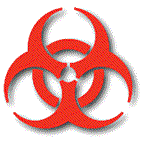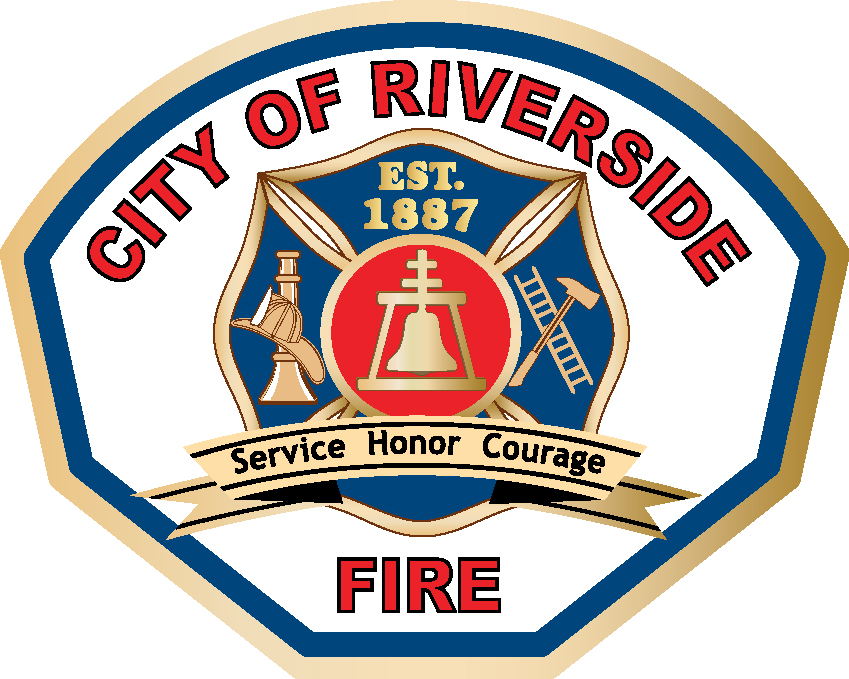Biological & Chemical Attack

Since the September 11th attacks on the World Trade Center and the Pentagon, the City of Riverside has received numerous inquiries from citizens and the media about how individuals could protect themselves in the event of a chemical or biological disaster. Such questions are understandable given concerns about subsequent attacks on US soil, so the following is designed to answer the most frequently asked questions.
What is Anthrax?
The form of anthrax that health authorities are most concerned about is inhalational anthrax, which occurs when a person breathes in anthrax spores. Anthrax vaccine is not available over the counter to the general public. Inhalation anthrax is not contagious, so it does not spread from person to person. Healthy people who come into contact with persons sick with inhalational anthrax cannot acquire the disease. It can be treated effectively with antibiotics, prescribed and monitored by a physician. In the event of an outbreak, there are plans in place at the local and Federal level to provide antibiotics to those exposed to the disease.
A second form of anthrax causing concern around the Country is cutaneous anthrax. This exposure occurs when anthrax spores touch the skin. Since anthrax exists in the natural environment, primarily around hoofed animals, this type of exposure is typically a risk only if the anthrax is able to enter the body through a cut or other opening in the skin. It cannot be readily absorbed and poses minimal risk in most cases. Cutaneous anthrax is marked by a boil-like lesion that eventually forms an ulcer with a black center. It responds well to antibiotics if treatment is started soon after exposure.
What are the symptoms of anthrax exposure?
Most biological agents, including anthrax, exhibit cold or flu-like symptoms in the early stages. As we enter the cold and flu season, it is important for people not to over-react to typical cold and flu symptoms, however. You are more likely to be struck by lightning than become a victim of a biological agent attack.
How to handle anthrax and other biological threat agents
Many facilities in communities around the country have received anthrax threat letters. Most were empty envelopes; some have contained powdery substances. The purpose of these guidelines is to recommend procedures for handling such incidents.
First of all - DO NOT PANIC!
Anthrax organisms can cause infection in the skin, gastrointestinal system, or the lungs.
To do, so the organism must be rubbed into abraded skin, swallowed, or inhaled as a fine, aerosolized mist. Disease can be prevented after exposure to the anthrax spores by early treatment with the appropriate antibiotics. Anthrax is not spread from one person to another person.
For anthrax to be effective as a covert agent, it must be aerosolized into very small particles. This is difficult to do, and requires a great deal of technical skill and special equipment. If these small particles are inhaled, life-threatening lung infection can occur, but prompt recognition and treatment are effective.
What do I do if I receive a suspicious package?
- Do not shake or empty the contents of any suspicious envelope or package.
- PLACE the envelope or package in a plastic bag or some other type of container to prevent leakage of contents.
- If you do not have any container, then COVER the envelope or package with anything (e.g., clothing, paper, trash can, etc.) and do not remove this cover.
- Then LEAVE the room and CLOSE the door, or section off the area to prevent others from entering (i.e., keep others away).
- WASH your hands with soap and water to prevent spreading any powder to your face.
- What to do next?
- If you are at HOME, then report the incident to local police.
- If you are at WORK, then report the incident to local police, and notify your building security official or an available supervisor.
- LIST all people who were in the room or area when this suspicious letter or package was recognized. Give this list to both the local public health authorities and law enforcement officials for follow-up investigations and advice.
Other Biological Threats
What are some of the other biological threats we face?
The two most likely threats at this time are smallpox and plague. Smallpox was eradicated worldwide in the 1970's and routine vaccinations were discontinued at that time. Only a small amount of vaccine exists in the world. If an outbreak occurs, a small supply would be sent to the infected area to treat and protect both citizens and emergency workers. Health authorities do not recommend routine vaccination at this time because there is no clear risk at this time and because the vaccine carries some very serious side effects. Vaccinations will be recommended only if there is clear evidence that the disease has resurfaced and that residents of the U.S. are being infected.
Should I ask my doctor for my own supply of antibiotics?
There's no reason to stockpile antibiotics. Many antibiotics are effective for a variety of diseases, but there is no single "miracle" drug. Many of these medicines have serious side effects, and improper administration increases your chances of developing immunity to the drug should it be needed for real illness in the future. Finally, most of these drugs have a limited "shelf life" and lose their effectiveness quickly after that expiration date.
Chemical Attack
What should I look for?
One of the many unsettling characteristics of chemical agents is that some of them cannot be seen or smelled. Citizens can protect themselves by observing the following rule of thumb: If a single person is on the ground, choking or seizing, it is likely this individual is having a heart attack or some sort of seizure. However, if several people are down, coughing, vomiting, or seizing, they could be reacting to the presence of a toxic substance. Evacuate the area immediately and dial 911, making sure to tell the dispatcher that a hazardous gas may be present.
Indoors:
If indoors, exit the building as rapidly as possible. Once outside, if you believe that you may have been exposed to the toxic substance, discarding your modesty and shedding your clothes could save your life. Taking off your outer clothing can remove roughly 80 percent of the contamination hazard. Look for a nearby fountain, pool, or other source of water so that you can quickly and thoroughly rinse any skin that may have been exposed (e.g., jump in the pool). Studies show that water alone is an effective decontaminant. Rescuers will arrive within minutes, and firefighters will hook up hoses and spray everyone to decontaminate them. Try to remain calm. Rescuers will triage everyone so that they can give medical attention to the most seriously affected individuals first. Even if you are showing no symptoms of exposure (e.g., eye problems), paramedics and physicians on scene will want to give you a check-up and advise you about follow-up care. Police officers will also want to speak with you about what you may have observed that could help them catch the individual(s) responsible.
Outdoors:
Birds and other small animals would very quickly be overcome by a poison gas, so if birds are dropping from the sky, that is another warning sign of toxic trouble. The most important thing to do is to get a physical barrier between you and the toxic cloud. Get indoors quickly--preferably into a building but even being inside a car will help. Shut all windows and doors and turn off the air conditioner. Try to plug any air drafts (e.g., under doors). This technique is known as "sheltering in place". Call 911 and notify authorities that a hazardous gas may be present. If that is indeed the case, the wind will carry the toxic hazard away within a relatively short period of time. Stay indoors, and turn on the television and/or radio for news and announcements. Authorities will notify you when it is safe to go outside. If you are at home, put your clothes in a plastic bag and take a shower, which will help remove any contamination that might have occurred before you were able to get indoors.
Should citizens buy gas masks?
The chances that terrorists will turn to poisonous substances instead of conventional bombs are very, very remote. Various news reports have noted that citizens are opting to purchase protective masks as a way to defend against chemical or biological terrorism. There are several important factors to bear in mind when considering this option.
In order for a mask to protect you against a chemical weapons attack, you would need to carry the mask with you at all times---24 hours a day, 7 days a week---and be prepared to put it on immediately if chemical emergency was suspected. To guard against a biological attack, you would need not only to carry the mask but also wear it at all times, since the presence of biological agents is not obvious without advanced sensors.
Gas masks capable of effectively protecting people from either chemical or biological agents are not a "one size fits all" purchase. At this point there are many different sizes and brands of masks available on the open market. It is critically important to make sure that the mask fits you properly---a loose gas mask defeats the purpose. Reputable dealers would be able to provide instructions not only on finding the right mask fit, but also on how to put it on, how to maintain it, and how to take care of the filters the mask uses as a barrier against microscopic particles.
All of that being said, if you would feel more comfortable purchasing a gas mask, by all means, go ahead. Steer clear of Internet auctions and classifieds. Be aware that most military surplus stores carry no guarantees that their masks will offer you any protection and cannot offer you good advice on how to properly fit the mask. Make sure that any seller can answer your questions about fit and upkeep. Note also that the only nation that has issued gas masks to all of its citizens in recent history is the state of Israel during the Gulf War. During the Gulf War, more Israelis died attempting to put on their gas masks than from Scud missile attacks.
What can I do to protect my family and myself?
Learn basic emergency preparedness skills like first aid and CPR. Have a well-stocked emergency kit at home, at work and in your vehicles. Be familiar with procedures and expectations at your children's schools and your workplace should an emergency occur. Most importantly, turn your concern into action. Take steps to be prepared. Preparedness offers peace of mind. For more information on how to do this, contact the City of Riverside Emergency Preparedness Program, listed below.
Additional resources may be found at the Riverside County Bioterrorism website.

